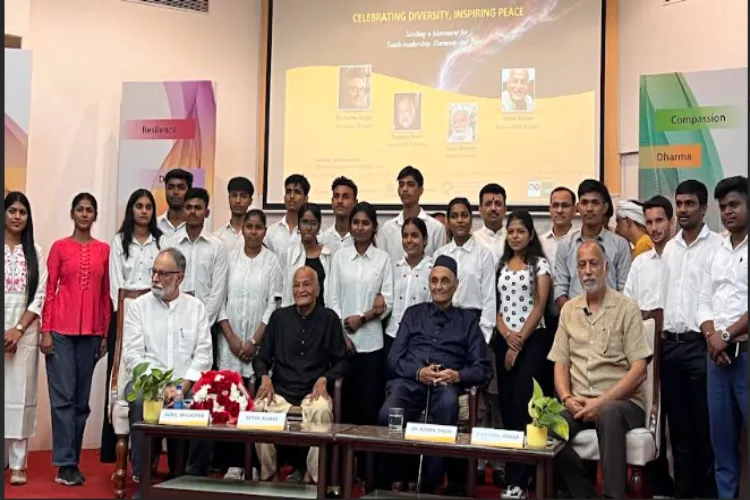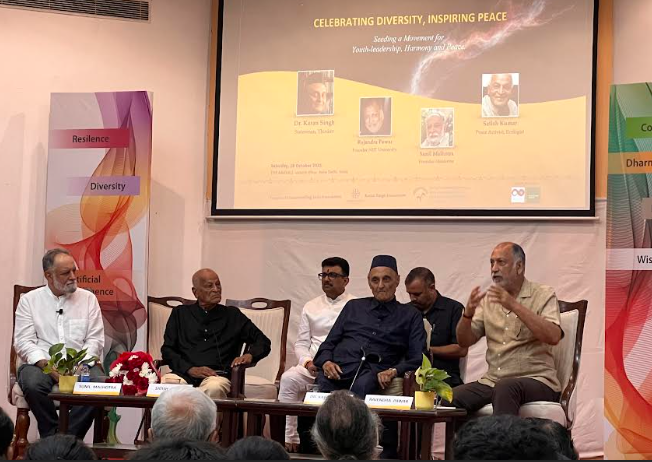
Ruchika Arora/New Delhi
In today’s world, following diversity and celebrating different ideas, cultures, and practices is a prerequisite for peace. This was the theme at “Celebrating Diversity, Inspiring Peace” — a gathering dedicated to youth, harmony, and peace, organised by the Temple of Understanding India Foundation, the Karan Singh Foundation, and the Foundation of Universal Responsibility in New Delhi.
The conversation featured eminent thinkers Dr Karan Singh, Statesman and scholar; Satish Kumar, Peace activist and ecologist; Rajendra Singh Pawar, founder and chairman of NIIT; and Sunil Mehrotra.
The speakers shared insights on India’s cultural and spiritual heritage, emphasising its relevance in encouraging balanced, courageous, and morally responsible young leaders.
Students from Manav Rachna University, led by Dr Geeta Thakur, and Salwan Public School engaged actively in an interactive question-and-answer session.
The atmosphere was one of reflection, curiosity, and inspiration, highlighting how India’s culture and diversity can offer guidance for building a more inclusive and compassionate society.
The central message was clear. While youth often look outward to new ideas, new cultures, or the West, India’s own cultural and spiritual traditions hold lessons that are deeper and highly relevant today. These are not abstract ideas from the past, but real contexts for personal development, community engagement, and global contribution.
Building a Strong Foundation
Dr Karan Singh, a former politician recognised for his writings on philosophy and spirituality, emphasised four essential pillars for a purposeful life: body, mind, emotion, and spirit. Body: “Build your body; don’t poison it with alcohol, tobacco, or harmful habits,” he said. A strong and healthy body provides the energy and stamina to contribute meaningfully to society.
“Sharpen your mind. Ask questions. Don’t accept ideas blindly,” he advised. A curious, receptive mind enables independent thought and informed decision-making. Emotion: Emotional intelligence, he explained, is as crucial as physical or intellectual strength. Learning to manage anger, fear, or envy allows young people to act with steadiness and clarity.

Dr Karan Singh and others at the function
He said, true spirituality lies in inner peace, not ritual. “The Lord resides in the heart of all beings — despite caste, creed, or religion,” he emphasised.
Understanding the oneness of all life forms is the essence of Indian spiritual thought and teaches unity amid diversity. “When you build these four aspects, you are ready to build a new world,” Dr Singh concluded.
Peace activist and ecologist Satish Kumar spoke about embracing diversity. “Nature favours diversity,” he said. “In both life and society, the more diverse something is, the stronger and more creative it becomes.”
He highlighted the dangers of modern uniformity — similar economies, architecture, fashion, and food worldwide. “Each country looks the same, and that uniformity is leading to loss,” he warned.
Kumar urged the youth to embrace India’s long-standing tradition of unity in diversity. “If you want peace in today’s violent world, follow diversity in all fields of life. Celebrate the different ideas, cultures, and practices that make us who we are,” he said.
He stressed that unity and diversity go hand in hand: “Unity is love and non-violence. It unites everyone, regardless of who you are. If you have love first, then you have truth. Only then can you engage in dialogue and learn from each other.”
He also highlighted the need for courage, the courage to take risks, be different, and resist the pressure to imitate. “We are too conditioned to follow one path. Real courage lies in embracing diversity.”
Students were actively engaged in discussion, asking how these lessons could be applied in daily life. A key takeaway was the idea that each individual is a seed — capable of growth, influence, and positive change.
“Be the change, and you will become the radiator,” Sunil Mehrotra said, invoking the examples of Buddha and Mahatma Gandhi. Both began as individuals, expressed their ideas through poems, songs, and dialogue, and gathered communities, sanghas that amplified their impact. The message to youth is to nurture your potential and, through it, create collective strength and unity.
Speakers also emphasised the importance of developing wisdom, not just depending on inherited knowledge. “Technology is moving faster than wisdom,” they noted. “Without ethical guidance and self-awareness, growth can become dangerous.”
Rajendra Singh Pawar, Padma Bhushan awardee and founder of NIIT University, talked about a vital principle: “Wars begin in fear; peace begins with trust.” He urged young people to become special leaders, those who think independently, act ethically, and unite rather than divide communities.
Leadership, Pawar explained, is rooted in trust, empathy, and dialogue. In a fragmented world, these qualities are essential for fostering sustainable peace. He closed the discussion by urging collective action. To move forward, it is imperative to bring together schools, foundations, universities, teachers, guides, and most importantly, the youth. He suggested that the students reconnect within the next ten days to share ideas and discussions, ensuring that the insights from the talk lead to practical, collective outcomes.
The “Celebrating Diversity, Inspiring Peace” event delivered a clear, actionable message: young people have the tools to build a new world — starting with themselves. Strengthen your body, sharpen your mind, shape your emotions, and nurture your spirit. Embrace diversity, lead with love and trust, and cultivate wisdom alongside knowledge.
ALSO READ: Azan dissolved my fears and Mussoorie turned out to be full of warmth
India’s cultural and spiritual heritage is not a relic of the past; it is a living guide. The wisdom, courage, and peace sought abroad already exist within these traditions. By reconnecting with their roots, India’s youth can lead with confidence, compassion, and creativity, building a future that is inclusive, resilient, and harmonious.
